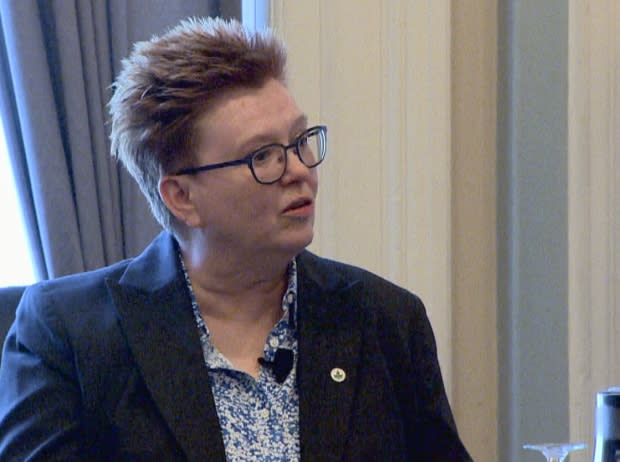Calgary non-profits hear ideas to tackle workplace harassment
Problems in Calgary's police force have stuck with its former chief months after his retirement.
Roger Chaffin retired early from his leadership role this year after a difficult chapter in his tenure that include complaints of harassment from more than a dozen female officers.
He shared his experience, and the lessons he learned, with non-profit leaders this week at a panel about toxic workplaces.
"I don't feel satisfied. I was with the service for over three decades and these issues will likely haunt me for quite a while because I was there the whole time," Chaffin told reporters before the panel discussion.
"There's lots of reasons to believe this sort of pathway to success is before the organization. It's just a matter of persistence and time and being able to be more aspirational, looking forward to what can really change."
Calgary non-profits gathered Thursday to learn how to improve their workplace cultures. Chaffin joined Pam Krause, president and CEO of the Centre for Sexuality, in a candid panel as part of a speaker series called Non-profits at Noon, organized by Calgary Chamber of Voluntary Organizations.
Non-profits, despite their often egalitarian mandates, are not immune to harassment and toxicity in the office, said Krause, who's done considerable work on these embedded cultural issues.
"I think the thing about what we miss out about the non-profit sector is we think that you know everything's equal and everything's fine," Krause said. "But there's some incredible power dynamics that happen.
'I think people know'
Culture starts at the top, so she recommends work begins with CEOs and developing policies, then moving onto staff training. Lastly, she recommends improving on-boarding practices for new employees to set a standard of expectations from the beginning.
If an executive is being inappropriate or bullying, or even allows casual comments, that can trickle down to everyone else, she said.
"I think one of the really interesting things is around people that do fundraising," Krause said. "You're in a room with a large donor and they act inappropriately to you and you feel like there's nothing you can do.
"I think there's many of those kinds of situations that happen."
That can be done in a deliberate way, she said, without making people feel trapped into political correctness, for example.
"I think respect is a thing we can learn and do. I think it can be consistent. I don't think we have to give people a pass," Krause said.
"I think people know. I think people just don't understand the impact it has on other people."
Bullying, harassment 'come to the fore very often'
David Mitchell, president of the voluntary organizations chamber, said he organized the panel with the Me Too movement in mind. The social movement saw people speak out against sexual harassment and assault, and led to several high profile people being charged or removed from their positions.
He said he believes the movement has shifted away from that celebrity focus to one where people at the grassroots are trying to fix cultures — including in non-profits.
"There are stories and issues of harassment and bullying that come to the fore very often," said Mitchell, referring to non-profits specifically. "They're not high profile, they don't make the news … but they're being dealt with — sometimes effectively, sometimes there's more training required."
Difficult police experience
Chaffin led the force in a human resources overhaul to address longstanding allegations of workplace toxicity and bullying.
After leaving his post early, he warned that the new chief would find it hard to get everyone on board with new HR reforms.
He said he struggled to get buy-in from all police executives, and the HR head hired to tackle the job resigned over what she described as dictatorship-style leadership.

"Leadership has to keep embracing a better way forward. Holding onto the past, holding onto some historical norms aren't going to get us anywhere," Chaffin said. "We're going to have to break free from our past and look for a better strategy into the future."
He said the force made the "early mistake" of assuming harassment wasn't happening to the police force. The situation improved, he said, when they decided to open the door to hearing officers' stories, and allowing in academics and agencies that could help map out a way to improvements.
"But it's complex. It's not so simple as saying, 'Hire a new chief and things will get better,'" he said. "It's really a case of spending the time to see the workplace in a way that we'd all like to see it exist, in a safer, more vibrant workplace."
He said the new chief, Mark Neufeld, may see some success pushing through reforms as he's an outsider to Calgary's police force, having come from the Alberta Association of Chiefs of Police and formerly of Edmonton and Camrose's police departments.

